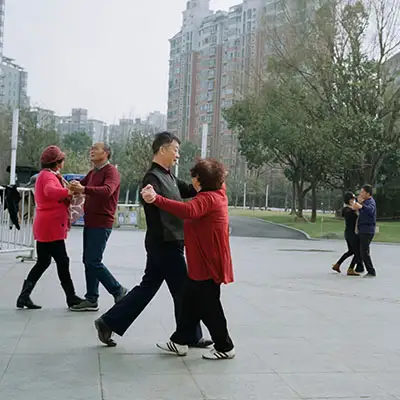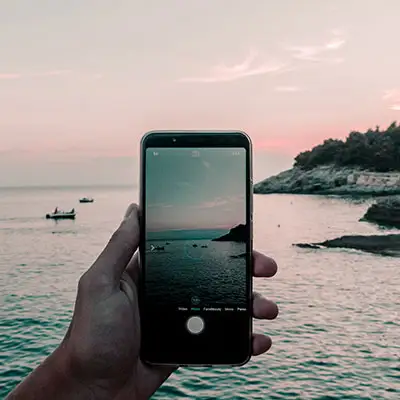Gratitude is a muscle. The more you flex it, the stronger it gets. Seeking gratitude, whether in ordinary everyday moments or life’s unusual events, can improve our whole outlook. That’s why we’re taking time to recognize why travel is important and how it can help us appreciate the gifts we’ve been given.
Why Should You Be Grateful for Travel?
By getting out and seeing the world, we have an opportunity to note things we previously took for granted. Just by being able to travel, there’s a lot to be thankful for.
Be grateful for people.
When we travel with a buddy, we learn more about each other and come to appreciate the talents the other brings to the table. I’m great at research and planning, but you don’t want me trying to navigate us through an unfamiliar city. I have friends with a better sense of direction for that.
We also meet amazing people when we travel. Some become long-time friends, others enrich our lives for only that moment. Both kinds are incredible. With travel, we come face-to-face with people who are totally different than us in how they talk, what they eat, what’s important to them, even down to something as basic as whether you wear shoes indoors. Without travel, we are isolated from these eye-opening encounters, and we’re less likely to develop understanding and empathy for others. We might not even realize what we don’t know until we are confronted with something new.
Be grateful for innovations in travel.
If you’ve traveled internationally, perhaps between the U.S. and Europe, you likely hopped on a plane, and in 12 hours or less, landed on a totally different continent. It wasn’t all that long ago that the same trip would have meant a multi-week journey on a ship. And if you weren’t among the ultra-wealthy, it would have been a very long — and very smelly — journey.
Reflecting on the ability for average joes to fly, former Seven Corners writer Luke Armstrong said, “Sometimes I forget flying is anything but a big hassle. With long lines at ticketing, ever-increasing baggage fees, passing through the rushed tension of security, canceled and delayed flights, airports and airlines seem to give us plenty of reasons to fly off the handle. And sometimes we do. We’ve all seen our fellow travelers break down over seemingly trivial matters, usually the final straw in a tortuous day of tough travel.
“But when I remember to plug into the energy of gratitude — wow — we’re flying folks! We are in the sky! We can go from the UK to NYC in a workday! We can get from NYC to LA in four hours. We can escape the cold of winter and go to any beach in the world.”
We also have travel websites and apps to enhance our adventures. It’s never been easier to find a home you can rent, in the location you want, for the price you can afford, all from the comfort of your couch. Or even from the passenger seat of a car. Growing up, we poured over AAA guidebooks, circled the hotels that looked promising (how many diamonds does that one have?), then called each one separately and hoped their rates hadn’t changed and that they had a vacancy. I still love a good guidebook, but there’s no denying that technology can remove a lot of headaches and obstacles to travel.
With innovative travel gadgets, we can get restaurant recommendations from locals who know all the secret spots, take fantastic pictures with just a tap on our phone, or send a distress signal from our watch if we get lost while hiking in the woods. We can get real-time language translation, find medical assistance on the spot, or learn more about priceless art at a museum without having to join a tour. That’s technology to be thankful for.
Be grateful for new perspectives.
When you see the same things every day, you tend to become blind to what’s right in front of your face. But when we change your environment — in other words, when you travel — we suddenly become more aware of what once seemed ordinary. That can spark gratitude.
Said Luke, “My three-year-old niece has a mountain of toys in her basement. My brother and sister-in-law’s language of love is giving, and my niece has gotten a lot of love in the form of material things!
“I met a boy in Kenya her age whose only toy was a rusty spoon he loved to dig in the dirt with. I know some kids in Guatemala whose only toy was a deflated soccer ball. Travel puts us face-to-face with the disparity that exists in our world. This doesn’t need to make us feel guilty. Guilt has never helped anyone. But it ought to make us feel grateful.”
Maybe you’re grateful that your kids have toys they enjoy or an education that’s going to help them get ahead in life. It could be that you have constant access to clean water. Let travel reveal these things to you, and appreciate them. And if you’ve never experienced that deep feeling of gratitude that comes with having your perspective flipped on its head, give voluntourism a shot.
Be grateful for health.
The demand for travel skyrocketed in 2022 as we came out of the pandemic and decided that nothing was going to keep us from taking a trip anymore. You might be grateful that we’re able to roam and cross borders again. Or you might be grateful that you’re personally healthy enough — no sniffles or debilitating joint pain or major illness that prevents you from leaving home — to get back out there.
Travel can also increase our gratitude for health when we see the medical care available to those in other areas. Seven Corners provides 24/7 travel assistance services, including arranging emergency medical evacuations. We do this because not every region is able to provide necessary medical care. Being able to receive treatment when we do get sick or hurt is certainly worth some gratitude.
Be grateful for experiences.
Life is made up of experiences, and those that come from the gift of travel tend to be some of the richest. The opportunity to try new foods, hear new sounds, explore sights we’ve only ever seen in books, breathe in a culture that may be dramatically different or surprisingly similar to our own — they are all experiences that form long-lasting memories.
Some of our experiences are life-changing, others we would rather forget (that time I got stranded in the Nashville airport during a blizzard comes to mind), but they are all worthy of our gratitude for how they have shaped who we are.
Be grateful for growth.
Travel makes us grateful for the skills that we have … and teaches us the grace and humility to keep working on the ones we haven’t mastered yet. When we explore unknown places, we often find ourselves in unusual situations, and that can make us feel awkward, lost, or even panicked. Anyone who frets over having to ask directions knows the feeling. But with travel, we can build confidence and independence, we learn problem-solving, we can be more creative and think outside the box. Before we even leave the house, we practice planning and research, budgeting, and packing, which is 100% a valuable skill.
Sometimes we travel for the primary purpose of building new skills. An adult gap year is all about learning and enriching your life personally or professionally. Of course, we can learn new things at home, but travel takes it to another level. And when we have the opportunity to explore while we grow, that’s something to be grateful for.
Be grateful for home.
Travel can make you grateful for what you left behind — a steady job that pays the bills and the next airfare, a comfortable home that protects you and your family, the neighbors that know you by name, and the community with that pizza place you crave when you’ve been out of town for too long. Missing home is just a sign that you’re thankful for what awaits you when you return.
How to Be More Thankful When You Travel
We know that travel is good for the soul, but remembering to be thankful is sometimes easier said than done. If you want to be more intentional with your gratitude, try these simple tips on your next trip.
- Slow down: It can be hard to have an attitude of gratitude when you’re on the go non-stop. Slow travel — staying in one location for longer, taking time to experience a single place rather than hopping from one attraction to the next, immersing yourself in a culture — gives you the time to reflect and recognize those key moments.
- Keep a journal: Combine a travel journal with a gratitude journal, and as you progress through your trip, note down the things you did that day that made you thankful. “Our flight arrived on time. I had the nicest chat with a street vendor. I’m in awe of the beautiful art here.”
- Be intentional about how you tell travel stories: When people ask how your trip went, share your gratitude rather than just reciting the list of where you went and what you ate. Swap a lifeless “Philadelphia was great,” for something richer like, “I enjoyed seeing the Liberty Bell. It really made me think about the freedoms we have here.”
- Give back when you travel: Luke gave away more than 10,000 friendship bracelets over the course of 10 years of travel. Some people do mission trips. Others commit to staying at Black-owned vacation homes or only eating at independently owned restaurants instead of tourist traps. Does traveling increase happiness? When you travel with the intention to give back, absolutely.
- Get off the beaten path: To have those perspective-changing experiences, you have to get outside your comfort zone a bit. That might mean leaving the all-inclusive resort, talking to a stranger, or dancing the tango even when you don’t know all the steps. Thank the universe for the opportunity to do something new, and then just do it.
- Practice gratitude at home: Like we said at the beginning, gratitude is a muscle that gets stronger the more you use it. To be more thankful for what you experience when you travel, keep the intentional practice of gratitude going every day, regardless of where you are.
Share Your Gratitude
Do you have a travel story that made you feel grateful? Can you think of a time for how travel helped you grow? Share it with our travel community on Facebook, Instagram, or Twitter.



